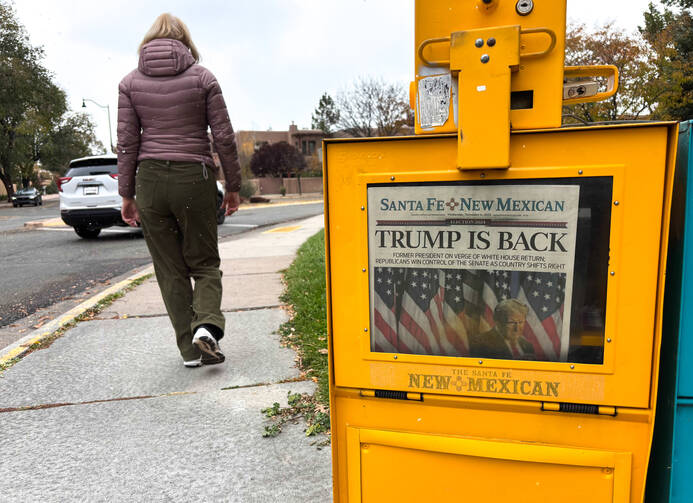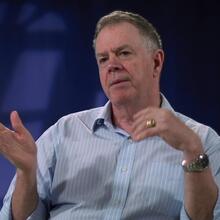Five matters have been on my mind in the weeks since the U.S. presidential election concluded, each of them connected to my work as a moral theologian. All five, I think, are crucial for us as a nation to consider as we enter into an unprecedented political and social moment in the United States: the impact of populism, the importance of social trust, the need for educational reform, the difference between interests and values and the value of our international partners.
Populism
Though most identify Donald J. Trump or the Republican Party as winners in the recent election, I believe populism won. As the new government is formed, we will inevitably see a struggle between traditional Republicans and populists. Because Republicans must know that the more they submit to populist control, the less they are an identifiable political party, it will be interesting to see how they negotiate with the populist forces to which they are indebted.
Populism is an alliance. As I wrote here three years ago, we need to recognize that there are at least four agent-groupings within the movement: the populist masses, populist leaders, wealthy populist supporters and vested interests—that is, political parties and other cultural and social leaders. In a manner of speaking, the “elitist” Democrats are the fifth group of the populist movement; to the extent that Democrats do not convincingly divest themselves of the elitist moniker, they leave themselves as a rallying point for the populists.
Each group has its own interests. President-elect Trump, his wealthy supporters and other vested interest endorsers each hope to get their own trophies. Still, it bears noting that the fourth group includes not only the Republicans, but church leaders as well, particularly evangelical Protestants and occasionally members of the U.S. Catholic Conference of Bishops.
Still, while their recent review of the Catholic Campaign for Human Development raised questions regarding the U.S.C.C.B.’s identification with Catholic social teaching, President-elect Trump’s insistent promise of a massive deportation beginning on day one of his next presidential term seems to have prompted the U.S. bishops into a critical stance regarding the threat.
Social trust
We must recognize the profound collapse of social trust that has occurred in our nation. In this election, populist leaders, wealthy backers and vested interests strategically managed to swell the masses by promoting social distrust. The rift between those who supported the two candidates is not simply a difference of candidates; it is a radical break in social trust. This is most evident in Mr. Trump’s nominations to the presidential cabinet, where the shock of one side meets no alarm on the other. Besides Mr. Trump’s proposal for mass deportations, that loss of social trust is my greatest concern as a moral theologian about this election.
Even though President Biden stood with the working class during his term, clearly many lower-income and working-class voters do not believe they matter to the Democratic Party. By extension, this populist distrust extends to the Democratic-led government as well. And though the Democrats may believe they were wrongly targeted, the social distrust is palpable and needs to be repaired.
The political scientist Francis Fukuyama raised his concerns about the erosion of social trust in 1995 in the best-selling Trust: The Social Virtues and The Creation of Prosperity. During the Covid-19 pandemic, he argued in The Atlanticthat “Trust is the single most important commodity that will determine the fate of a society.”
Esteban Ortiz-Ospina and Max Roser have also written a significant study on social trust. They noted that trust is the fundamental resource that provides the stability, development and sustainability of any institution. Without it, the institution does not function; with it, it thrives. Among their concerns, they noted that “economic inequality is negatively related to trust.” This economic inequality galvanized the populist campaign.
Right after noting economic inequality, the authors highlight the other major catalyst of distrust: access to education. They note that “in all countries those individuals with tertiary education were by far the group most likely to report trusting others. And in almost every country, those with post-secondary non-tertiary education were more likely to trust others than those with primary or lower secondary education.” If there is an unaddressed matter that failed to emerge from the recent presidential campaign, it is the need for educational reform.
Educational reform
Many working-class Americans have watched their educational opportunities progressively diminish over the past decades. In University Ethics: How Colleges Can Build and Benefit from a Culture of Ethics, I argued that “access to a major university diminishes year by year for lower-income and working-class people.” In fact, the diminishment begins precisely by being born into these classes.
Inasmuch as local primary and secondary schools are significantly financed by local property taxes, a child’s access to higher education is considerably determined by the zip code of one’s birth. Not unified and integrated standards of education, but qualitative differences in teaching and resources, distinguish the landscape of early education in our country.
Clearly one’s access to a college education is determined by one’s primary and secondary education. But young people need to belong to cultures that have social structures that provide passageways to tertiary education. For lower-income and working-class Americans, the passageway to tertiary education is the community college.
Take a guess what percentage of college students are in community colleges? Five percent, 10 percent, 20 percent, 25 percent? Nope. Unfortunately, when we think of American colleges, we tend to think of the Ivies. But the Ivies make up less than 1 percent of those in higher education, while more than 40 percent of college students begin their passageway through community colleges, hoping that they can eventually enter a four-year college or university.
With inadequate funding, part-time adjunct faculty bearing the brunt of the teaching, receiving universities changing admissions policies, and the financial needs of students requiring them to work while attending college, the pipeline is in most parts of the country frustratingly narrow.
We overlook their challenges because we overlook community colleges, and the working class knows that. From politicians to ethicists, few recognize the challenges they have. Worse, many historians of higher education have not even considered community colleges to be tertiary institutions and therefore have not studied them. Until our community colleges—where the largest cohort of our tertiary students study—get the recognition they deserve, the matter of higher education further alienates our working class.
Still, in the recent election, while economics was frequently a subject of discussion, education was not. From primary through secondary to tertiary levels, our educational system, I think, is the real core of the problem of the withering social trust in our country.
Interests must be based on values
As we develop an equitable and responsible national education policy, we will need to re-introduce the notion that good governmental policies need to be based on values rather than just interests.
Obviously, most voters consider their own interests when deciding on a candidate. But when interests do not engage values, they are simply unethical—and the lack of ethics eventually erodes and bankrupts any society. Yet those groups who fanned populist wishes in this past election singularly focused on interests and not values. The banal, unjust and harmful threat of mass deportation is not the only issue where this comes into focus; the renewed emphasis on fracking is another example of proposals that respond to interests but not values.
Our international allies
Besides teaching theological ethics, I am the Vice Provost for Global Engagement at Boston College, developing relations with 18 other mostly Catholic and Jesuit schools around the world. This past semester, no matter where I was, I heard the same exact question: “Will Trump win? I ask because if he does, we will be more affected by it than you will be.” The question was asked in fear, not in hope. And I heard it in Bogota, Santiago, Manila, Seoul and Dublin!
As we see the President-elect’s cabinet taking shape, the overarching interest seems to simply be to better our economy. This stance animates arguments for mass deportations, fracking and tariffs. Indeed, the overarching argument against continuing to support Ukraine seems to be simply cost. Yet the United States plays as important a role politically as it does economically in world affairs, from alliances and treaties to balances of power, human rights and the concern for political stability.
Like the issue of interests without values, the economic without the political seems, at least on the world stage, a sharp departure from our former American positions. In fact, the President-elect’s own ambiguous relationship with Russian President Vladmir Putin seems to be as unaddressed as his overall political agenda, which again seems reducible singularly to the economic. Witness the critical importance of tariffs in the incoming administration’s emerging foreign policy.
The singular stress on economic concerns secured the populist vote for Mr. Trump, but life is more than the economic; unless we attend to our alienated fellow citizens, social distrust will continue to spread and lasting economic prosperity will become a pipe dream. Whether we alienate the immigrant, the working class, the Democrats or the Republicans, our allies or the planet, we fragment the body politic and stimulate social distrust. The singularity of the economic agenda might win an election, but it cannot itself promote the common good.
What comes next
Come Jan. 20, on the inaugural day of his second term, President-elect Trump has promised voters that he will begin a massive deportation effort. It is a deeply menacing threat without any indication of how matters of due process, human rights, respect of persons, respect of families and other matters of human dignity, justice and mercy will govern the deportation. And though we see indications that some Republicans will try to tone down Mr. Trump’s threats, many members of the party that will take control of every branch of our government on that day have not taken any evident steps to address the massive deportation itself.
I, for one, am not waiting for Inauguration Day. I think the threat of mass deportation needs to be urgently addressed by bishops, teachers, theologians, politicians and preachers. We cannot wait to see what happens, especially since the President-elect insists that he means business on that day. As we do, let us find ways not to further division nor to widen the gap between the so-called elite and the populists, but let us use this threat to show how America—by attending to the problem of migration—can also attend to its lower and working classes that have been alienated by the humiliating hallways of our educational structures.
In time, we may see that each side needs to trust the other to abjure class-containment, mass deportation and the reckless use of the planet’s resources. Maybe by opposing the issues rather than the persons, we will find not only economic solutions, but more cohesive, humane and just ones.








